Crossway Studies on Inerrancy (5 vols.)
Digital Logos Edition
Overview
How we approach biblical inerrancy is a telling component of how we approach our lives, those around us, and the Bible. In this collection, a number of respected scholars, including Vern Poythress, Greg Beale, and Mike Krugel, offer a variety of cogent and persuasive arguments in favor of the traditional evangelical view of inerrancy. Each volume offers profound insights into the complex and sometimes controversial ideas at work when it comes to biblical inerrancy—what it means and what difference it makes to our understanding and interpretation of the Bible and Christianity. These books will help you recognize the importance of inerrancy in the life of the church today and equip you with the knowledge necessary to engage with others.

- Explores inerrancy as a worldview, apologetic method, and theological construct
- Establishes historically based arguments for defending inerrancy
- Examines the destructive effects of inerrancy’s displacement within evangelicalism
- Title: Crossway Inerrancy and Scripture Collection
- Publisher: Crossway
- Volumes: 5
- Pages: 1,400
- Christian Group: Evangelicals
- Resource Type: Monographs
- Topic: Apologetics
Individual Titles
- Inerrancy and the Gospels: A God-Centered Approach to the Challenges of Harmonization by Vern S. Poythress
- Inerrancy and Worldview: Answering Modern Challenges to the Bible by Vern S. Poythress
- Can We Trust the Gospels?: Investigating the Reliability of Matthew, Mark, Luke, and John by Mark D. Roberts
- The Erosion of Inerrancy in Evangelicalism: Responding to New Challenges to Biblical Authority by Gregory K. Beale
- Canon Revisited: Establishing the Origins and Authority of the New Testament Books by Michael J. Kruger
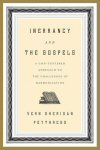
Serious Bible readers all recognize that there are differences between accounts of the same events in Matthew, Mark, Luke, and John, and no responsible reader can simply sweep these differences under the rug. But can all of the accounts still be reconciled with a belief in biblical inerrancy?
Responding to the questions surrounding the gospel narratives, New Testament scholar Vern Poythress contributes a worthy case for inerrancy in the gospels and helps readers understand basic principles for harmonization. He also tackles some of the most complicated exegetical problems, showing the way forward on passages that have perplexed many, such as the centurion’s servant, the cursing of the fig tree, and more.
All those interested in the authority of Scripture will find in this volume great encouragement and insight as Poythress has provided an arresting case to stem the tide of skepticism.
I can think of no one in the world better qualified to write a defense of biblical inerrancy than my lifelong friend Vern Poythress. In this book, Poythress provides an outstanding resource that carefully analyzes every important Gospel passage where an inconsistency or a contradiction has been alleged. He draws on the rich resources of centuries of church history and his own remarkable wisdom in analyzing human linguistic communication to provide a sure-footed, thoughtful, humble, and even spiritually challenging guide to these key passages. This is the best book I know of for dealing with Gospel difficulties. It is profoundly wise, insightful, and clearly written, and it will surely strengthen every reader’s confidence in the trustworthiness of the Bible as the very words of God.
—Wayne Grudem, research professor of theology and biblical studies, Phoenix Seminary
Shall we defend biblical inerrancy with arguments that are naïve and unconvincing? Or shall we assume that discrepancies among the Gospels cannot be resolved? Vern Poythress shows us that we need not make such a choice. Clear, convincing, accessible, practical, Inerrancy and the Gospels is everything we need in a book on this topic. While sharpening readers’ skill at harmonization, Poythress also develops a thoughtful, God-honoring foundation for addressing Gospel difficulties and the spiritual challenges that accompany them. I want every student, every pastor, and every skeptic I know to read this book—and recommend it to their friends.
—C.D. “Jimmy” Agan III, associate professor of New Testament and director of homiletics, Covenant Theological Seminary
When Vern Poythress has chosen to write on a particular subject, the resulting book has always been (in my memory) the best book on that subject. This one is about the inerrancy of Scripture, dealing particularly with problems in the Gospel narratives, and I know of nothing better in the field. It is fully cogent, very helpful, linguistically sophisticated, and, above all, faithful to the Scriptures as the word of God.
—John M. Frame, chair of systematic theology and philosophy, Reformed Theological Seminary, Orlando, Florida
Vern S. Poythress is professor of New Testament interpretation at Westminster Theological Seminary, where he has taught for nearly four decades. He has earned six academic degrees—including a PhD from Harvard University and a ThD from the University of Stellenbosch. He is the author of numerous books, including Foundations of Contemporary Interpretation, What are Spiritual Gifts, and Logic.
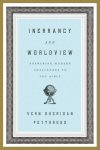
Though the Bible presents a personal and relational God, popular modern worldviews portray an impersonal divine force in a purely material world. Readers influenced by this competing worldview hold assumptions about fundamental issues—like the nature of humanity, evil, and the purpose of life—that present profound obstacles to understanding the Bible.
In Inerrancy and Worldview, Vern Poythress offers the first worldview-based defense of scriptural inerrancy, showing how worldview differences create or aggravate most perceived difficulties with the Bible. His positive case for biblical inerrancy implicitly critiques the worldview of theologians like Enns, Sparks, Allert, and McGowan. Poythress, who has researched and published in a variety of fields—including science, linguistics, and sociology—deals skillfully with the challenges presented in each of these disciplines. By directly addressing key examples in each field, Poythress shows that many difficulties can be resolved simply by exposing the influence of modern materialism.
Inerrancy and Worldview’s positive response to current attempts to abandon or redefine inerrancy will enable Christians to respond well to modern challenges by employing a worldview that allows the Bible to speak on its own terms.
This book is no ordinary defense of inerrancy that merely focuses on proposed solutions to several difficult verses (though it does examine some of them). Rather, it is a wide-ranging analysis that exposes the faulty intellectual assumptions that underlie challenges to the Bible from every major academic discipline in the modern university world. I think every Christian student at every secular university should read and absorb the arguments in this book. It is profoundly wise, insightful, and clearly written, and it will surely strengthen every reader’s confidence in the trustworthiness of the Bible as the very words of God.
—Wayne Grudem, research professor of theology and biblical studies, Phoenix Seminary
Vern Poythress has written what I consider to be definitive books on many subjects, including biblical interpretation, language, science, and sociology. In Inerrancy and Worldview, he brings his insights from these disciplines and more together to address the relation of biblical inerrancy to worldview. He shows quite convincingly that the issue of inerrancy is not just a matter of asking whether this or that biblical passage is factual. Rather, our attitude toward the claim of biblical inerrancy depends on our general view of how God is related to the cosmos and to us as individuals and societies. And that general view, in turn, depends on our relationship to Jesus Christ. The book gets deeper into the question of inerrancy than any other book I know.
—John M. Frame, chair of systematic theology and philosophy, Reformed Theological Seminary, Orlando, Florida
Every new item that Vern Poythress writes is thoughtful, creative, and worth reading. This book is no exception. Among the many things I like about it is his emphasis on the personalist worldview of the Bible, as over against the impersonalism that dominates modern Western culture. Besides its crucial contribution to his own subject in clarifying how it is that God communicates to us through the Bible, I think this basic idea will be fruitful for a good number of other topics as well. Thanks, Dr. Poythress, and thanks, God, for giving him to the church.
—C. John Collins, professor of Old Testament, Covenant Theological Seminary
Vern S. Poythress is professor of New Testament interpretation at Westminster Theological Seminary, where he has taught for nearly four decades. He has earned six academic degrees—including a PhD from Harvard University and a ThD from the University of Stellenbosch. He is the author of numerous books, including Foundations of Contemporary Interpretation, What are Spiritual Gifts, and Logic.
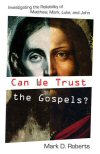
Attacks on the historical reliability of the Gospels—especially their portrayal of Jesus Christ—are nothing new. But are these attacks legitimate? Is there reason to doubt the accuracy of the Gospels? By examining and refuting some of the most common criticisms of the Gospels, author Mark D. Roberts explains why we can indeed trust the Gospels, nearly two millennia after they were written. Lay readers and scholars alike will benefit from this accessible book, and will walk away confident in the reliability of the Gospels.
Can We Trust the Gospels? is quite simply the best effort I have ever read by a serious scholar to communicate what scholars know about the Gospels and why that should indeed encourage us to trust them and thus to trust Jesus Christ.
—Hugh Hewitt, professor of law, Chapman University
There is a crisis of confidence about the Gospels, fueled by sensational claims about supposedly new Gnostic Gospels with a ‘revised standard’ view of Jesus. As Mark Roberts makes clear, the earliest and best evidence we have for the real Jesus is the canonical Gospels, not the much later Gnostic ones.
—Ben Witherington III, professor of New Testament, Asbury Theological Seminary
This book not only makes a compelling case for trusting the Gospels, it illuminates the creative ways in which God worked to bring us His Word. Roberts’ brilliant little book deserves to be widely read by both skeptics and believers.
—Joe Carter, senior editor, Acton Institute
Mark D. Roberts is senior pastor of Irvine Presbyterian Church. He received his PhD in New Testament from Harvard University and teaches at Fuller Theological Seminary. Mark has published dozens of articles and several books, including Can We Trust the Gospels?, No Holds Barred: Wrestling with God in Prayer, and Hod God Changes Your Brain.
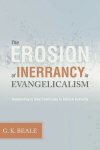
Due to recent popular challenges to evangelical doctrine, biblical inerrancy is a topic receiving an increasing amount of attention among theologians and other scholars. Here G.K. Beale attempts vigorously and even-handedly to examine the writings of one leading postmodernist, Peter Enns, whose writings challenge biblical authority. In support of inerrancy, Beale presents his own set of challenges to the postmodern suppositions of Enns and others.
How can the Bible be historically inaccurate while still serving as the authoritative word on morality and salvation? Beale concludes that it cannot, and his work will aid all who support biblical inerrancy in defending their position against postmodern attacks. This is an issue that affects the entire body of Christ.
Confidence in the authority and inerrancy of Scripture is ebbing today, even in evangelicalism. Postmodernism and certain hermeneutical presuppositions threaten to undermine the foundations of evangelicalism. Greg Beale’s sturdy, convincing, and courageous defense of the accuracy and inerrancy of Scripture bolsters our assurance that God’s Word is true. Praise God for this scholarly and spirited defense of the truth of Scripture.
—Thomas R. Schreiner, professor of New Testament interpretation, The Southern Baptist Theological Seminary
At last, a leading biblical scholar has produced a full-blown defense of biblical inerrancy in a user-friendly style. This is just what is needed in the current debate, and Beale has provided it magnificently.
—Gerald Bray, research professor of divinity, history, and doctrine, Beeson Divinity School
The nature of Scripture has been an ongoing issue of controversy in evangelicalism for decades, yet today the orthodox position of inerrancy is under severe attack as in no other period—and the attack is coming from evangelicals themselves. Beale has done a great service in attempting to bring us back to the right way of thinking about the Scriptures. They are indeed fully inerrant and fully authoritative. This book is a must-read for our generation.
—John D. Currid, professor of Old Testament, Reformed Theological Seminary, Charlotte, North Carolina
Gregory K. Beale is a Christian scholar, currently a professor of New Testament and biblical theology at Westminster Theological Seminary. He has made a number of contributions to conservative Biblical hermeneutics, particularly in the area of the use of the Old Testament in the New Testament. He served as the president of the Evangelical Theological Society in 2004. He is the author, coauthor, or editor of several books, including Commentary on the New Testament Use of the Old Testament, A New Testament Biblical Theology: The Unfolding of the Old Testament in the New, The Book of Revelation: New International Greek Testament Commentary, and The Right Doctrine from the Wrong Texts?: Essays on the Use of the Old Testament in the New.
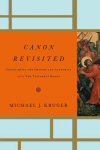
This study of the New Testament canon and its authority looks deeper than the traditional surveys of councils and creeds, mining the biblical text itself for direction in understanding what the original authors and audiences believed the canon to be. Canon Revisited distinguishes itself by placing a substantial focus on the theology of canon as the context within which the historical evidence is evaluated and assessed. In effect, this work successfully unites both the theology and the historical development of the canon, ultimately serving as a practical defense for the authority of the New Testament books.
This book fills a lacuna in evangelical scholarship. Rarely does academic specialization in canon studies converge with thorough commitment to biblical authority. In this work, close evaluation of the history of approaches to the canon is matched by a richly theological interpretation of what it means to call Scripture our ‘canon.’ Careful, accessible, and wise in his explorations, Michael Kruger has given us a gift that will keep on giving for generations to come.
—Michael Horton, professor of systematic theology and apologetics, Westminster Seminary California
The Christian canon of Scripture is under fire now more than ever. Sadly, even as so much of this fire has been issuing from academic quarters, we are left with more smoke than light. Stepping into the gap with a fresh synthesis is Michael Kruger’s Canon Revisited. Gracefully uniting theology and history, Kruger invokes the chief Reformed argument for canon and gives it fresh wings.
—Nicholas Perrin, dean, Wheaton College Graduate School
Of all the recent books and articles on the canon of Scripture, this is the one I recommend most. It deals with the critical literature thoroughly and effectively while presenting a cogent alternative grounded in the teaching of Scripture itself. Michael Kruger develops the historic Reformed model of Scripture as self-authenticating and integrates it with a balanced appreciation for the history of the canon and the role of the community in recognizing it. This is the definitive work on the subject for our time.
—John M. Frame, chair of systematic theology and philosophy, Reformed Theological Seminary, Orlando, Florida
Michael J. Kruger is president and professor of New Testament at Reformed Theological Seminary, Charlotte, and the author of a number of articles and books on early Christianity.
Reviews
1 rating

Drew Reynolds
1/27/2018
